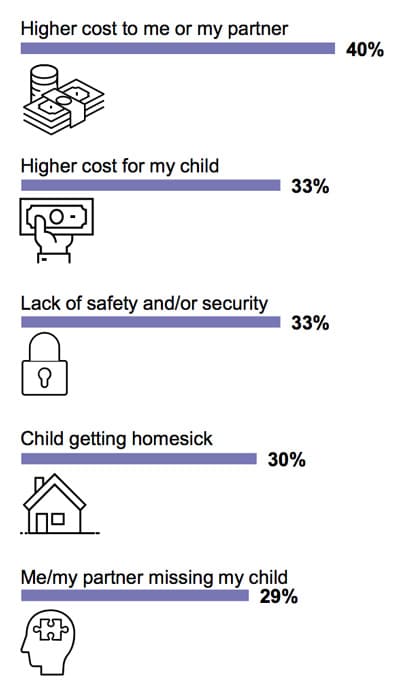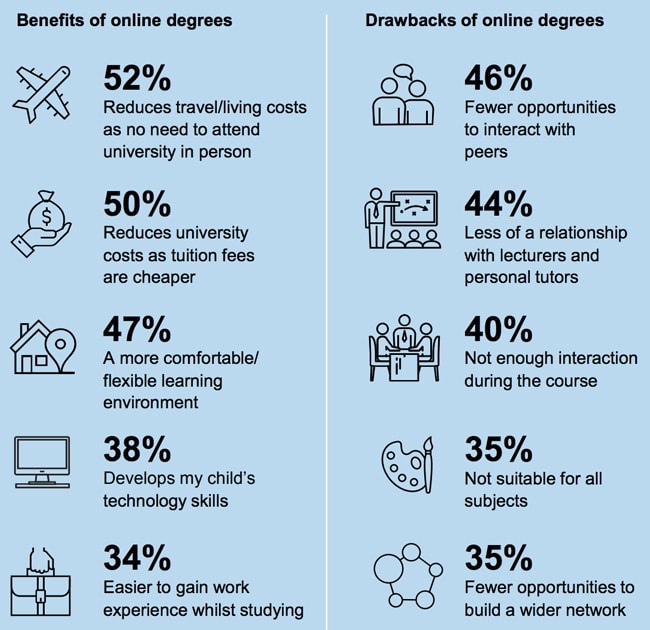Growing openness to online programmes among parents
The HSBC’s Value of Education series has proven to be an interesting window into how parents look at study abroad. The latest edition, and the fourth in the series, was released late last month and it gathers the responses of 8,481 parents across 15 countries: Australia, Canada, China, Egypt, France, Hong Kong, India, Indonesia, Malaysia, Mexico, Singapore, Taiwan, UAE, UK, and the US. In all cases, respondents had at least one child aged 23 or younger currently (or about to be) enrolled at some level. The survey was carried out in February 2017 and the resulting report, Higher and higher, offers some new insights on the extent to which parents are supporting their children’s study and the factors that influence their decision making. The headline finding is that parents spend an average of just over US$44,000 on their children’s education, including everything from school fees to uniforms to tuition and accommodation at the primary, secondary, and undergraduate levels. Nearly nine in ten parents (87%) are helping to directly fund their children’s education to some extent. This average obscures a wide range of spending on education across the sample countries with respondents from Hong Kong leading the table with a reported average lifetime spend of US$132,000 per child. This compares to average spending of US$43,000 in China and US$18,500 in Indonesia. Most parents (85%) with a child at university or college are helping to fund costs of study, and of parents considering postgraduate education for their child, 76% expect to contribute to that level of study as well. The vast majority (82%) are prepared to make personal sacrifices in order to help their children succeed. Nearly a third (31%) report giving up personal time or hobbies in support of their child’s education, and 25% either “drastically reduced” or completely stopped leisure activities and holidays. “In today’s highly competitive global job market, education for young people has never been more important,” said HSBC Group Head of Wealth Management Charlie Nunn. “Parents across the world appreciate this and are willing to invest time and money to help their children get the best start in life. Their unwavering support shows in the personal, lifestyle and financial sacrifices they are making. From forfeiting ‘me time’ to giving up hobbies or reducing leisure activities, parents are going the extra mile to help their child succeed.”
Driven by opportunity; cautious about cost
Most respondents (78%) see a university education as the key to better career opportunities and a brighter future for their children. More than four in ten (41%) would consider a university education abroad for their child, including 65% in the UAE, 60% in Indonesia, 55% in India, and 54% in China.
In contrast to current research indicating that most students do not have an institution in mind when they begin to plan for study abroad, the HSBC survey suggests that many parents do. Around two-fifths (39%) say they have specific universities in mind when they think about study abroad with quality of teaching (45%), prestige of the university (41%), and increased job prospects for their children (41%) the main criteria for choosing an institution overseas.
Indeed, the theme of cost carries through the report, with 40% citing the higher costs of study abroad as the primary barrier to overseas study for their child. Just over a third (34%) acknowledged that they did not know how much it would cost for their child to study at university abroad.

Thinking about online
Cost factors again in a growing openness to online study among the parents in this year’s HSBC survey. Most parents (73%) are aware of the growing range of online university programmes, and 60% would consider a university programme for their child that is either completely or partially delivered online.
As always, lying behind these average response rates are wide variations from country to country, running from 82% or 76% for India and China to 45% and 29% for the UK and France.
When asked to comment on the benefits of online programmes, most cited cost savings for tuition, travel, and living costs as the main advantages. More specifically, three in ten said that they would consider an online degree if the costs were 50% less than that of a traditional, campus-based programme.














